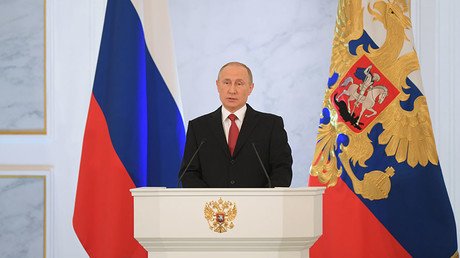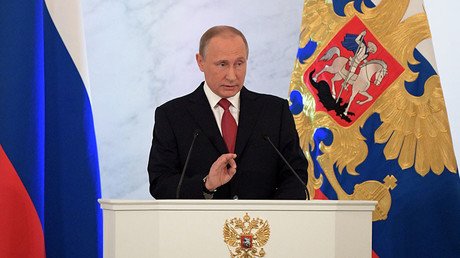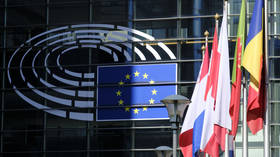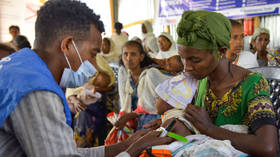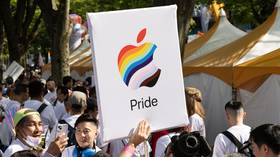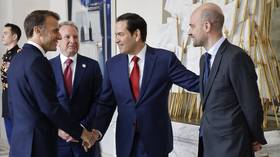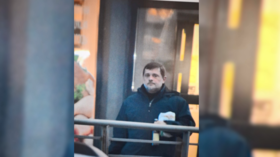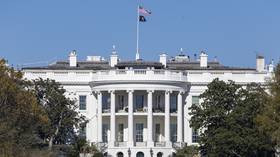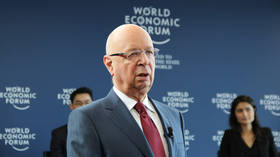Putin: We won’t allow infringement of Russia’s rights, will decide our own fate
During his annual address to Russian lawmakers, President Vladimir Putin said that Moscow is ready for dialogue with its international partners, but will not allow them to infringe on its interests or meddle in its decision-making.
“We will not allow any infringement on the interests of the Russian Federation and we will manage our own destiny without tips and unsolicited advice,” the Russian leader said.
He noted, however, that Russia is ready to participate in solving global and regional crises when necessary.
“We understand the extent of our responsibility and are sincerely willing to take part in solving global and regional problems, of course, where our involvement is appropriate, necessary, and in demand,” the president stated.
“We are committed to a friendly, equal dialogue, to upholding the principles of justice and mutual respect in international affairs; we are ready for serious discussion on the creation of a stable system of international relations in the 21st century. Unfortunately, in this respect, the decades since the end of the ‘Cold War’ have gone by in vain,” Putin noted, apparently referring to current tensions with NATO and the EU.
He said that Russia stands for “the safety and the possibility of development, not for just the chosen few, but for all countries and peoples, for respect for international law and the diversity of the world.”
The president also said that Russia’s policy towards its Asian partners, China and Japan, is not opportunistic or a response to the deterioration in US-relations, but based on Russia’s plans for long-term development.
“Once again, I stress that Russia’s active [Asia] policy is not dictated by some opportunistic considerations of today, not even by the cooling in relations with the United States or the European Union, but by long-term national interests and trends of global development,” the president said.
In his speech, the president also urged the United States to join Russia to jointly fight international terrorism.
“We hope to unite our forces with the United States in the fight against the real threat, not the fictional one – international terrorism,” he said. The president also emphasized the need “to strengthen non-proliferation regimes,” noting that “attempts to upset the strategic balance are extremely dangerous and could lead to a global catastrophe.”
The president made his remarks during the annual address to the Federal Assembly – the two chambers of the Russian parliament, the cabinet, regional leaders the judiciary and other dignitaries – on Thursday. Over 600 journalists, as well as representatives from both Russian and international media outlets, have been covering the proceedings, which took place in the Kremlin. It has been the 23rd such event in Russia’s modern history and the 13th speech delivered by Vladimir Putin.
Putin’s remarks about non-hostility were appreciated by Ken Livingstone, the former mayor of London, who said that fear of supposed Russian aggression is a phenomenon that long predates Putin’s leadership.
“We’ve had this all my life,” he told RT. “I grew up in a world where we were told we were under threat from the Soviet Union. The first American presidential election that I can remember was Kennedy v Nixon. Kennedy won, saying we’ve allowed the Russians to overtake us, and as soon as he got into office he was briefed that Russia had four missiles capable of reaching America [but] America had 400 capable of reaching Russia.”
Martin McCauley, British historian and Russia analyst, added that this was another sign that Russia’s profile was going up in the international community.
“It’s a great opportunity for Vladimir Putin and for Russia,” he said. “They can re-shape, re-set the foreign agenda. The possibility is the next French president will be Francois Fillon; he wants sanctions to go; the whole European situation’s changing; then Trump almost certainly doesn’t think that sanctions are effective. The opportunities are vast for Russia to enter the international area as a leading player.”
